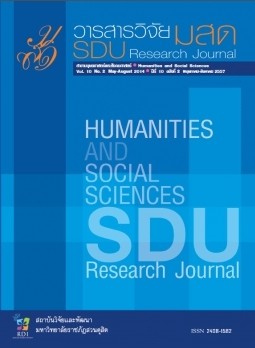ฟินเทค : รูปแบบหนึ่งของการพัฒนานวัตกรรมทางการเงินในศตวรรษที่ 21
Keywords:
Financial innovation, Fin Tech, Related rules & regulationsAbstract
The financial system of Thailand has been a major mechanism in driving economic and social development. The regulatory unit initiated by the government, together with the improvement of existing regulations of the financial system after the economic crisis, is
required to cope with abrupt and critical fluctuations in the Thai financial system. Both the government and private sectors have regarded the financial system as very significant due to its role as the source of funds for the country in expanding the latter’s business to overseas, while supporting the former’s infrastructure investment. The report of World Economic Forum, however, has indicated a number of weaknesses in the Thai financial system, e.g. the readiness and costs of financial services, loan access, and funds generating via the capital market. The said weaknesses will inevitably affect the long-term growth rate of the real economic sector. However, despite the fierce competition in international commerce and investment as well as the declining growth rate of Thai economy, Thailand still holds on to a number of factors conducive to Fin Tech business development. Hence, the government and the private sectors should strenuously enable Fin Tech and innovation-related entrepreneurs to implement technology while contemplating on impacts on the public and service providers. They should also cooperate to generate the development and promotion of Fin Tech business and all related sectors to increase the competitiveness of Fin Tech business in Thailand. In this aspect, necessary measures should be supported to facilitate the procedures, e.g. permit issuance, improvement and enactment of regulations and business-related laws, initiation of roles in mediating and driving business mechanisms, provision of technological security system,
promotion and production of talents as required by business, and importation of foreign experts to help develop Fin Tech in Thailand.
References
Working Paper No. 08-07. Asian Development Bank & Bank of Thailand. (2015). Country Partnership Strategy. Asian
Development Bank Thailand 2013–2016.
Blake, M., Hughes, D. & Vanham, P. (2016). World Economic Forum. [Online] Available at: https://www.weforum.org/agenda/2016/04/5-things-you-need-to-know-about- fintech/ Bose I. & Mahapatra, R. (2001). Business data mining - A machine learning perspective.
Information & Management, 39(3), 211 – 225. Chen, H., Chiang, R., & Storey, V. (2012). Business intelligence and analytics: From big data to big impact. MIS Quarterly, 36(4). 1165 - 1188. Chunhachinda, P. (2017). FinTech : Towards Thailand 4.0. Electronic Journal of Open and Distance Innovative Learning, 7(1), 1-23. Fiscal Policy Office (2015 & 2016). Fiscal Policy Statement 2015-16. Debt Policy Coordination Office Ministry of Finance Government of Pakistan. Froomkin, M. (1997). The Internet as a source of regulatory arbitrage. In B. Kahin & C. Nesson Eds.) Borders in Cyberspace. MIT Press. Härle, P., Havas, A., & Samandari, H. (2016). The future of bank risk management. McKinsey & Company. Hendershott, T. & Riordan, R. (2013). Algorithmic trading and the market for liquidity. Journal of Financial and Quantitative Analysis, 48(4), 1001 - 1024. Hendershott, T., Jones, C., & Menkveld, A. (2011). Does algorithmic trading improve liquidity?. Journal of Finance, 66(1), 1 – 33. Houston, J., Lin C., & Ma, Y. (2012). Regulatory arbitrage and international bank flows. Journal of Finance, 67(5), 1845 – 1895. Lusardi, A. & Mitchell, O. (2011). Financial literacy and planning: Implications for retirement wellbeing. Working Paper. National Bureau of Economic Research. Mollick, E. (2014). The dynamics of crowdfunding: An exploratory study. Journal of Business Venturing, 29(1), 1 – 16. Murphy, D., Shrieves, R., & Tibbs, S. (2009). Understanding the penalties associated with corporate misconduct: An empirical examination of earnings and risk. Journal of Financial and Quantitative Analysis, 44(1), 55-83. National Research Council. (2016). (Draft) Thai Economy Research Strategy on “Financial Technology (FinTech) and Thai Financial System Development.Pornchai Chunhajinda. (2017) FinTech : Towards Thailand 4.0 [Online] Available at: http:// e-jodil.stou.ac.th/filejodil/14_1_592.pdf Rodriguez, J. (2007). Measuring financial contagion: A Copula approach. Journal of Empirical Finance, 14(3), 401–423. Sarinee Achavanuntakul. (2017). Capital Allocation in Thai Economy under Globalization (co- authored with Prof. Kittichai Sae-lee), presented at year-end symposium,
Economics Department, Thammasat University. Sangroya, A., Kumar, S., Dhok, J., & Varma V. (2010). Towards analyzing data security risks in Cloud computing environments. Communications in Computer and Information Science, 54, 255 – 265. Skinner, C. (2016). The five major use cases for financial block chains. Brave New Coin. Thailand Development Research Institute (TDRI). (2016). Strategies to Improve Governance in Thailand during the 12th National Economic and Social Development Plan. Bangkok: National Economic and Social Development Board. (In Thai) The Economist (2014). Global Microscope 2014. [Online] Available at: http://centerforfinancialinclusionblog.files.wordpress.com/2014/11/eiu_global_microscope_2014.pdf [Accessed 30 March 2018]. The Secretariat of the House of Representatives. (2017). System Reform to Support Financial Innovations. Report of Subcommittee on Economic Reform, The National Reform Steering Assembly (NRSA). World Bank Group. (2015). Worldwide Governance Indicators: Country Data Report for Thailand, 1996-2014. Washington D.C.: World Bank. Accessed September 18, 2016, http://info. worldbank. org/governance/wgi/pdf/c213.pdf.








